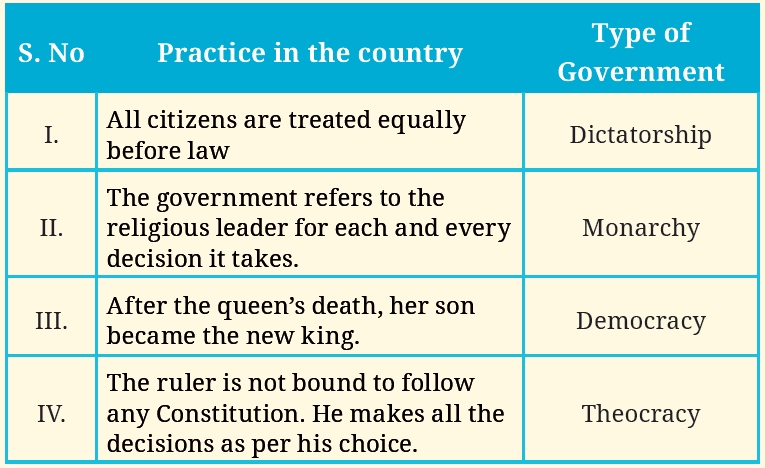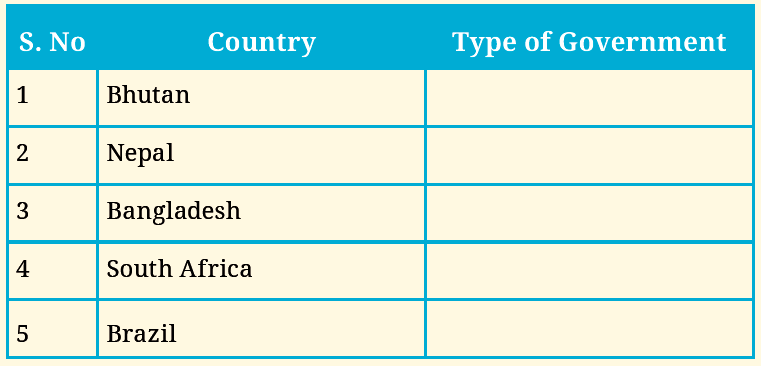Solutions For All Chapters – Social Science Class 7
From the Rulers to the Ruled: Types of Governments
1. Write names of the various types of government that you have learnt in the chapter.
Answer:
The various types of government mentioned in the chapter are:
Democracy (Direct Democracy, Representative Democracy: Parliamentary and Presidential)
Monarchy (Absolute Monarchy, Constitutional Monarchy)
Theocracy
Dictatorship
Oligarchy
2. Which type of Government does India have? And why is that called that type?
Answer:
India has a Parliamentary Democracy. It is called this because the people elect representatives to form the Parliament, which makes laws. The Prime Minister and the Council of Ministers, who are part of the executive, are also members of the Parliament (legislature). The executive is accountable to the Lok Sabha, which is the lower house of Parliament, and continues to work as long as it has the confidence of the Lok Sabha.
3. You read that an independent judiciary is present in all types of democracies. State any three reasons why you think it is important for the judiciary to be independent.
Answer:
An independent judiciary is important in a democracy because:
- Protects Fundamental Rights: It ensures that every citizen’s rights, like equality and freedom, are protected without interference from the government.
- Ensures Fairness: It makes sure laws are applied fairly to everyone, including the government, without bias.
- Checks Other Organs: It prevents the legislature and executive from misusing their power by reviewing their actions and ensuring they follow the Constitution.
4. Do you think democratic government is better than other forms of government? Why?
Answer:
Yes, a democratic government is better than other forms of government because:
In a democracy, people choose their leaders through elections, so the government represents the will of the people.
It gives citizens rights like freedom of speech, equality, and the right to vote, which are not always guaranteed in other systems like dictatorship or absolute monarchy.
The government is accountable to the people, and if it doesn’t work well, people can change it through elections.
It promotes fairness and works for the welfare of all citizens, unlike oligarchy or dictatorship, where only a few people hold power.
5. These are some practices in a few different countries. Can you match the practice with the type of government?
Answer:
| S. No | Practice in the Country | Type of Government |
|---|---|---|
| I | All citizens are treated equally before law | Democracy |
| II | The government refers to the religious leader for each and every decision it takes. | Theocracy |
| III | After the queen’s death, her son became the new king. | Monarchy |
| IV | The ruler is not bound to follow any Constitution. He makes all the decisions as per his choice. | Dictatorship |
- I. Democracy: In a democracy, all citizens are treated equally before the law, as it is a core principle.
- II. Theocracy: In a theocracy, religious leaders guide decisions, as seen in countries like Iran.
- III. Monarchy: In a monarchy, the throne is passed to the next family member, like a son becoming king.
- IV. Dictatorship: In a dictatorship, the ruler has absolute power and does not follow a constitution.
6. Below is a list of countries. Find out the types of government these countries have:
Answer:
| S. No | Country | Type of Government |
|---|---|---|
| 1 | Bhutan | Constitutional Monarchy |
| 2 | Nepal | Parliamentary Democracy |
| 3 | Bangladesh | Parliamentary Democracy |
| 4 | South Africa | Parliamentary Democracy |
| 5 | Brazil | Presidential Democracy |
- Bhutan: Constitutional Monarchy – Bhutan has a king, but the government is run by elected officials under a constitution.
- Nepal: Parliamentary Democracy – Nepal has a parliament where elected representatives choose the prime minister.
- Bangladesh: Parliamentary Democracy – Bangladesh has a parliamentary system with a prime minister and elected parliament.
- South Africa: Parliamentary Democracy – South Africa has a parliament that elects the president, who acts as both head of state and government.
- Brazil: Presidential Democracy – Brazil has a directly elected president who leads the executive, separate from the legislature.
7. What are possible hurdles in a democracy in achieving its values and ideals? How can they be overcome?
Answer:
Hurdles in a Democracy:
- Corruption: Some leaders may misuse power for personal gain, affecting fairness and trust.
- Wealth Disparity: Rich people may have more influence, making it unequal for others.
- Manipulation of Information: False news or controlled media can mislead people’s choices.
- Erosion of Judiciary Independence: If the judiciary is influenced, it cannot protect rights fairly.
How to Overcome Them:
- Fighting Corruption: Strict laws and transparent systems, like public audits, can reduce corruption.
- Reducing Wealth Disparity: Policies ensuring equal opportunities in education and jobs can help.
- Promoting True Information: Media should be free, and people should be taught to check facts.
- Protecting Judiciary: Ensure the judiciary is free from government control and appoints judges fairly.
Citizens should stay active, vote wisely, and raise their voices to keep democracy strong.
8. Democracy is different from monarchy and dictatorship. Explain.
Answer:
Democracy is different from monarchy and dictatorship in the following ways:
- Source of Power: In a democracy, the people choose the government through elections. In a monarchy, a king or queen rules, often inheriting power. In a dictatorship, one person or a small group takes power, often by force.
- People’s Rights: In a democracy, citizens have rights like freedom of speech, equality, and voting. In a monarchy, especially absolute monarchy, rights may be limited by the king’s decisions. In a dictatorship, citizens have very few or no rights, and the ruler controls everything.
- Accountability: In a democracy, the government is accountable to the people and can be changed through elections. In a monarchy, the king or queen may not be accountable, especially in absolute monarchies. In a dictatorship, the ruler is not answerable to anyone.
- Law-Making: In a democracy, elected representatives make laws. In a monarchy, the king or queen may make laws (in absolute monarchy) or share power with a parliament (in constitutional monarchy). In a dictatorship, the ruler makes all laws without consulting others.
The Big Questions (Page 185)
1. What are the different types of government?
Answer:
The different types of government are:
- Democracy: Rule by the people, either directly (Direct Democracy) or through elected representatives (Representative Democracy, like Parliamentary or Presidential).
- Monarchy: Rule by a king or queen, either with full power (Absolute Monarchy) or limited power (Constitutional Monarchy).
- Theocracy: Rule based on religious laws and led by religious leaders.
- Dictatorship: Rule by one person or a small group with absolute power.
- Oligarchy: Rule by a small, powerful group, often wealthy or influential people.
2. Where do governments get their power from?
Answer:
Governments get their power from different sources depending on their type:
In a Democracy, the power comes from the people who vote to choose their leaders.
In a Monarchy, the power comes from the royal family, passed down through generations, or sometimes claimed as divine right.
In a Theocracy, the power comes from religious beliefs and is held by religious leaders.
In a Dictatorship, the power is taken by force or control by one person or a small group.
In an Oligarchy, the power comes from a small group of wealthy or influential people who control decisions.
3. How does a country’s government interact with the people?
Answer:
A country’s government interacts with the people in different ways based on its type:
In a Democracy, the government is chosen by the people through elections. It listens to people’s needs, makes laws for their welfare, and is accountable to them. People can express their opinions freely.
In a Monarchy, the king or queen may make decisions for the people. In constitutional monarchies, elected officials interact with people, but in absolute monarchies, the ruler has more control.
In a Theocracy, the government enforces religious rules, and people are expected to follow them. Interaction is based on religious laws.
In a Dictatorship, the government controls people’s lives, limits their freedom, and may not allow them to question decisions.
In an Oligarchy, only a small group interacts with the government, and ordinary people have little say.
4. Why does democracy matter?
Answer:
Democracy matters because:
- It gives people the power to choose their leaders through voting, ensuring the government represents their wishes.
- It provides rights like freedom of speech, equality, and the right to vote, allowing people to live freely and express themselves.
- The government is accountable to the people, so if it doesn’t work well, people can change it through elections.
- It aims for the well-being of all citizens, promoting fairness and prosperity, unlike other systems where only a few hold power.
- It encourages participation, so everyone’s voice can be heard, making society more just and inclusive.



Leave a Reply